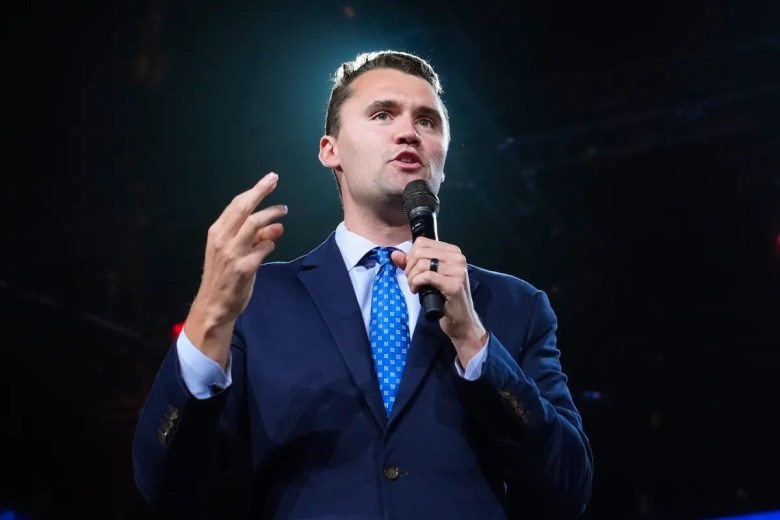Politics
Historian Critiques Charlie Kirk’s Legacy After His Assassination

Following the assassination of Charlie Kirk, founder of Turning Point USA (TPUSA), historian Tariq Khan discussed the implications of Kirk’s legacy in a September 17 interview. Khan, who has faced personal attacks from Kirk’s organization, emphasized the necessity of standing firm against white supremacist ideologies, which he claims Kirk helped propagate.
Khan, an educator at Yale University and author of “The Republic Shall Be Kept Clean: How Settler Colonial Violence Shaped Antileft Repression,” has firsthand experience with the intimidation tactics employed by TPUSA. His ordeal began in late 2017 when he was heckled during a political speech at the University of Illinois Urbana-Champaign. Members of TPUSA not only disrupted his speech but also issued threats against his family, leading to a campaign of harassment that Khan described as life-altering.
The fallout from this incident escalated when a misleading headline emerged, falsely framing Khan as an aggressor. “Every single word in that headline was false—including ‘conservative,’” Khan stated. He noted that such misrepresentation was a tactic used by TPUSA to further its agenda, which, according to him, extends beyond conservatism to include authoritarianism and a dangerous narrative that dehumanizes various marginalized groups.
Khan criticized the broader political environment, pointing out that influential figures, including Donald Trump, amplified TPUSA’s false narratives, leading to a surge of threats against him. “People in power were retweeting their false story about me,” Khan added, highlighting the significant consequences of such actions.
He characterized Kirk’s approach as one that “poisoned political discourse” in the United States, arguing that Kirk’s rise was built on a foundation of intimidation and harassment. Reports from the Associated Press suggest that TPUSA’s leadership benefited financially from this culture, with at least $15.2 million directed to associated companies, indicating a lucrative connection between the organization’s operations and its aggressive political tactics.
Despite the challenges he faced, Khan received substantial support from his academic community, which resisted external pressures to distance itself from him. This support, coupled with endorsements from labor unions and academics worldwide, allowed him to endure TPUSA’s campaign against him. Conversely, many others who faced similar targeting were not as fortunate, losing jobs and stability due to the pressure exerted by Kirk’s organization.
Khan’s perspective gained traction as various commentators, including Ezra Klein and California Governor Gavin Newsom, expressed sorrow over Kirk’s death, with Newsom asserting that continuing Kirk’s work would honor his memory. Khan, however, contended that the notion of Kirk as a mere debater is fundamentally misleading, citing the inherent danger in accommodating fascist ideologies.
In light of recent developments, including Trump’s announcement to classify “antifa” as a terrorist organization, Khan reiterated the need to adopt a no-tolerance stance towards fascism. “Don’t give them any concessions whatsoever,” he urged, emphasizing that treating fascists’ demands as reasonable only emboldens their agenda.
Khan’s reflections resonate within a broader discourse on the challenges posed by white supremacy and the responsibility of society to confront it. He articulated the belief that the line between acceptable debate and the dehumanization of individuals should never be crossed. “The right of all human beings to exist and live with dignity ought never to be up for discussion,” he asserted.
This perspective aligns with analyses from writers like Ta-Nehisi Coates, who have critiqued the normalization of hate speech in political discourse. Coates noted the historical parallels between past and present ideologies, emphasizing the necessity of rejecting any framework that legitimizes dehumanization.
As the conversation surrounding Kirk’s legacy continues, it highlights the urgent need for a collective stance against the resurgence of extremist ideologies and the importance of protecting vulnerable communities from the threats they pose. Khan’s insights serve as a stark reminder of the ongoing struggle against racism, anti-immigrant sentiment, and transphobia, urging society to recognize the dangers inherent in allowing such ideologies to gain traction.
-

 World5 months ago
World5 months agoSouth Korea’s Foreign Minister Cho Hyun to Visit China This Week
-

 Business5 months ago
Business5 months agoStarling Bank Plans Secondary Share Sale, Targeting $5.4 Billion Valuation
-

 Top Stories5 months ago
Top Stories5 months agoMunsang College Celebrates 100 Years with Grand Ceremony
-

 World5 months ago
World5 months agoPAS Aims to Expand Parliamentary Influence in Upcoming Election
-

 Business7 months ago
Business7 months agoKenvue Dismisses CEO Thibaut Mongon as Strategic Review Advances
-

 Lifestyle6 months ago
Lifestyle6 months agoHumanism Camp Engages 250 Youths in Summer Fest 2025
-

 Sports6 months ago
Sports6 months agoDe Minaur Triumphs at Washington Open After Thrilling Comeback
-

 Sports7 months ago
Sports7 months agoTupou and Daugunu Join First Nations Squad for Lions Clash
-

 Top Stories7 months ago
Top Stories7 months agoColombian Senator Miguel Uribe Shows Signs of Recovery After Attack
-

 World7 months ago
World7 months agoASEAN Gears Up for Historic Joint Meeting of Foreign and Economic Ministers
-

 Health6 months ago
Health6 months agoNew Study Challenges Assumptions About Aging and Inflammation
-

 Business7 months ago
Business7 months agoOil Prices Surge Following New EU Sanctions on Russia









